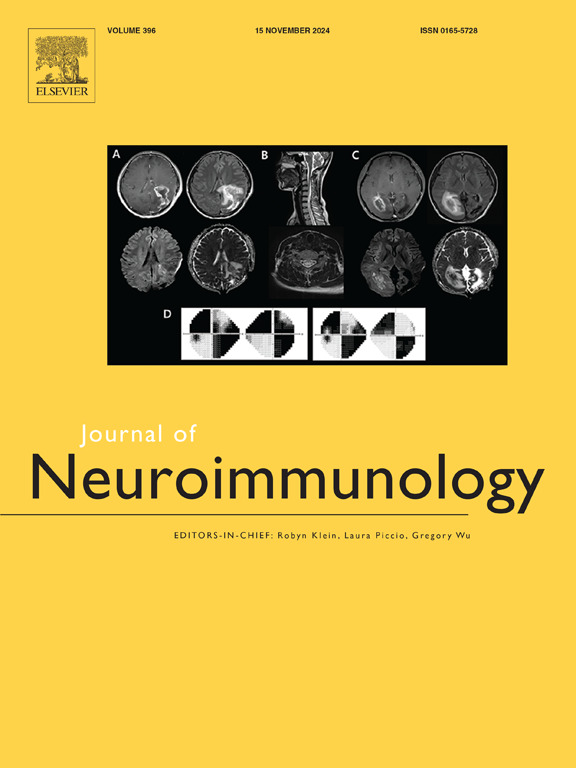Gut microbiome depletion modulates cocaine-induced behavioral and transcriptional responses in female mice
IF 2.5
4区 医学
Q3 IMMUNOLOGY
引用次数: 0
Abstract
Cocaine use disorder is a chronic relapsing condition with no FDA-approved biological treatments. The gut microbiome has emerged as a key modulator of neurobehavioral responses to drugs of abuse, yet its role in female animals has been under studied. Here, we investigated the effects of gut microbiome depletion on cocaine-induced behavioral and transcriptional responses in female mice. Adult female C57BL/6 J mice were treated with a non-absorbable oral antibiotic (Abx) cocktail for two weeks to deplete the gut microbiome, followed by behavioral assays assessing locomotor sensitization and conditioned place preference (CPP) to cocaine. Abx-treated females displayed reduced locomotor sensitization and a shifted CPP dose-response curve, characterized by attenuated preference at higher cocaine doses. Transcriptional analysis of the nucleus accumbens (NAc) revealed that microbiome depletion suppressed cocaine-induced expression of immediate early genes (c-Fos, FosB, Nr4a1, Egr4) and altered dopamine-related (Drd1) and microglial (Cx3cr1) markers. These findings contrast with prior studies in males, where microbiome depletion enhanced cocaine-induced behavioral plasticity. The observed effects suggest distinct gut-brain signaling as an important contributor to cocaine reinforcement and neuroadaptations in females. This study provides novel insights into microbiome regulation of addiction-relevant behaviors and highlights the necessity of sex-specific investigations in neuropsychiatric disorders. Further research is needed to elucidate the molecular pathways linking gut dysbiosis to substance use vulnerability in females.
肠道微生物组耗竭调节雌性小鼠可卡因诱导的行为和转录反应
可卡因使用障碍是一种慢性复发的疾病,没有fda批准的生物治疗方法。肠道微生物群已成为滥用药物的神经行为反应的关键调节剂,但其在雌性动物中的作用尚未得到研究。在这里,我们研究了肠道微生物群消耗对雌性小鼠可卡因诱导的行为和转录反应的影响。用不可吸收性口服抗生素(Abx)鸡尾酒治疗成年雌性C57BL/6 J小鼠两周,以消耗肠道微生物群,然后进行行为分析,评估运动致敏性和对可卡因的条件位置偏好(CPP)。服用abx的雌性小鼠表现出运动敏感性降低和CPP剂量-反应曲线的移位,其特征是高剂量可卡因的偏好减弱。伏隔核(NAc)的转录分析显示,微生物组缺失抑制了可卡因诱导的即时早期基因(c-Fos, FosB, Nr4a1, Egr4)的表达,并改变了多巴胺相关(Drd1)和小胶质(Cx3cr1)标记物。这些发现与先前对男性的研究相反,在男性中,微生物群的减少增强了可卡因引起的行为可塑性。观察到的结果表明,不同的肠-脑信号是女性可卡因强化和神经适应的重要贡献者。这项研究为微生物组对成瘾相关行为的调节提供了新的见解,并强调了在神经精神疾病中进行性别特异性研究的必要性。需要进一步的研究来阐明女性肠道生态失调与物质使用脆弱性之间的分子途径。
本文章由计算机程序翻译,如有差异,请以英文原文为准。
求助全文
约1分钟内获得全文
求助全文
来源期刊

Journal of neuroimmunology
医学-免疫学
CiteScore
6.10
自引率
3.00%
发文量
154
审稿时长
37 days
期刊介绍:
The Journal of Neuroimmunology affords a forum for the publication of works applying immunologic methodology to the furtherance of the neurological sciences. Studies on all branches of the neurosciences, particularly fundamental and applied neurobiology, neurology, neuropathology, neurochemistry, neurovirology, neuroendocrinology, neuromuscular research, neuropharmacology and psychology, which involve either immunologic methodology (e.g. immunocytochemistry) or fundamental immunology (e.g. antibody and lymphocyte assays), are considered for publication.
 求助内容:
求助内容: 应助结果提醒方式:
应助结果提醒方式:


